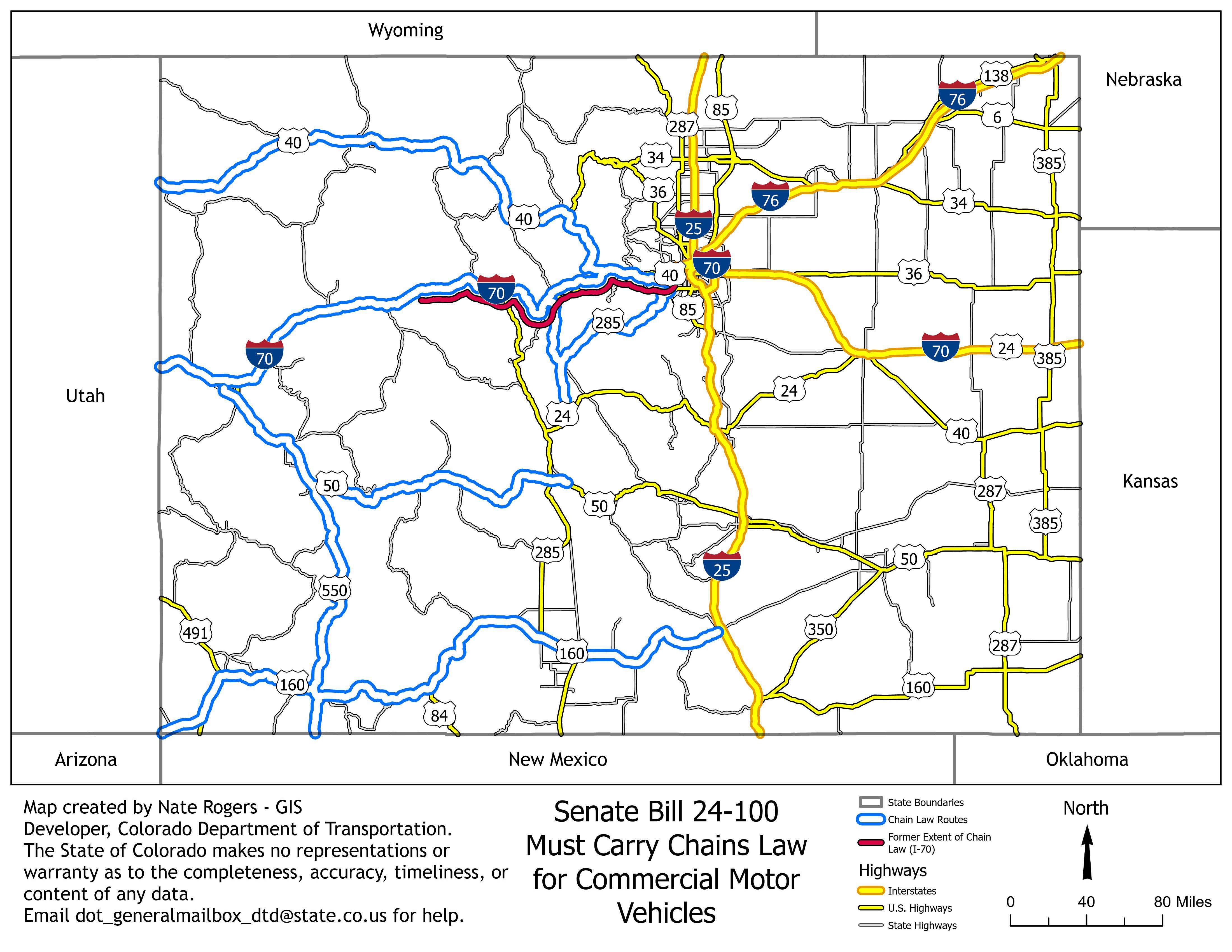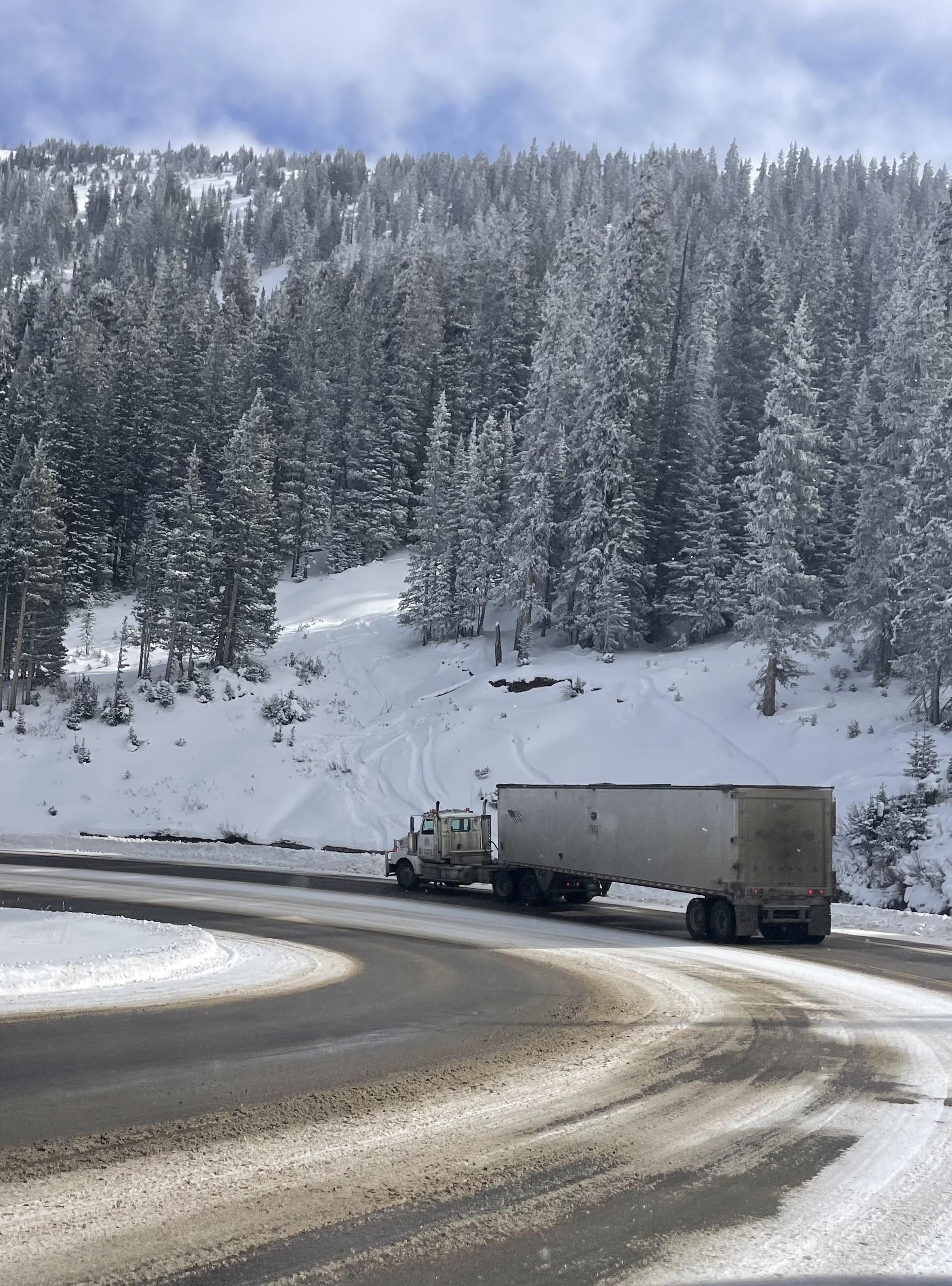Chain Up Tips
Chain Up Tips & Resources
New Update to the 'Must Carry' Law
Beginning on September 1, 2024 all Commercial Motor Vehicles with a GVWR of 16,001lbs or more must carry chains or approved alternate traction devices on newly identified Colorado Mountain Corridors. Please review the Must Carry Law Flyer for more information.
*Spanish and Russian translation available upon request.*
This is an expansion of the original Must Carry law on a portion of the I-70 corridor. For full law text please refer to Senate Bill 24-100.

Truck Safety & Winter Driving in Colorado
Colorado Chain Up Tips

This information applies to Colorado state, federal and interstate highways.
- Carrying Chains In Colorado
Commercial vehicles driving through Colorado on the below corridors must carry appropriate chains or approved alternative traction devices from September 1 through May 31.
- I-70 west of MP 259 (Morrison)
- CO-9 MP 63 to MP 97 (Frisco to Fairplay)
- US Route 40 west of MP 256 (Empire)
- US Route 50 west of MP 225 (Salida)
- US Route 160 west of MP 304 (Walsenburg)
- US Route 285 west of MP 250 (Morrison)
- US Route 550 from MP 0 to 130
- CMV by Definition
Commercial Motor Vehicle (CMV) for purposes of these rules means a vehicle having a manufacturer's gross vehicle weight restriction (GVWR) or GCWR of at least 16,001 pounds and used in commerce on public highways, or a GVWR or GCWR of at least 16,001 pounds and used to transport at least 16 passengers, including the driver
- Chain Law
To travel on a state highway when the Commercial Motor Vehicle Chain Law is in effect, a CMV must have chains or approved alternate traction devices (ATDs) on at least four of the drive wheel tires, or all of the drive wheel tires if the vehicle has fewer than four drive wheel tires. Buses are required to chain or have ATDs on two drive wheel tires.
- CMV's required to chain 4 drive tires:
- Straight Trucks
- Single Drive Axle Combinations
- Tandem Drive Axle Combinations
- Auto Transporters
- CMV's required to chain 2 drive tires:
- Busses
- Hot shots (pulled by a pickup truck or similar meeting the 16,001 lb or more weight requirement for carrying chains)
- CMV's required to chain 4 drive tires:
- Chain Law Notifications
The applicable traction and chain law requirements will be messaged out through the CDOT notification process, including Variable Message Signs, static signs, other official traffic control devices as appropriate, the CDOT travel website, telephonic messaging system, email, text notifications, and other technologies. Notifications will specify by mile points and by exit number when chains are required.
- Chaining Up
The Commercial Motor Vehicle Chain Law is a requirement for all large vehicles to affix chains or alternate traction devices (ATDs) to all drive tires (up to four).
- Tire Chains
Tire chains include but are not limited to metal chains which consist of two circular hoops, one on each side of the tire, connected by not less than nine evenly spaced chains across the tire tread. Tire chains shall meet the SAE classification as by the National Association of Chain Manufacturers. Clip-on chains are not permitted, nor is any other device not designated as an approved ATD.
- Tire Cables
Tire cables are traction devices made of steel cable as opposed to steel chain link, which has high strength steel cross member rollers 0.415" or greater in diameter. If chains are on the 2 outside tires of one drive axle, any tire cable may be used to cover 2 tires on the other drive axle. AutoSocks and tire cables cannot be used together.
- Alternative Traction Devices
Alternative Traction Devices (ATD) must be one of the ATD included in the CDOT Approved Product List (APL). Drive wheel sanders and pneumatically driven chains are also allowed.
- Passing Requirements When Chain Law is Active
CMVs shall be restricted to the right lane unless encountering a stalled or slower moving vehicle that would result in the loss of traction, in which case the CMV may utilize the left or center lane to pass if the movement can be made safely and without interference with other traffic. Any such pass must be completed without losing traction and the CMV must return immediately to the right lane upon completion of the pass.
Frequently Asked Questions (FAQ)
- Are chains required for trailers?
No
- Must hazardous material tankers and transporters comply with the chain law?
Yes. Vehicles placarded for hazardous loads may pass the chain up signs, and install chains where pavement is covered by snow or ice at a safe location outside the traveled portion of the highway.
- When can chains be removed?
The Chain Law shall remain in effect until either notice is communicated to the traveling public by Variable Message Signs (VMS), static sign or other CDOT notification, or when the centerline or lanes are visible on a descending grade.
- Where are chain up stations?
COTrip Map of Chain and Brake Check Stations
- What are the fines for violations?
Penalty for not carrying chains on the below Interstate and Highway corridors from Sept. 1 - May 31 is a $100+ fine plus a $32 surcharge.
- I-70 west of MP 259 (Morrison)
- CO-9 MP 63 to MP 97 (Frisco to Fairplay)
- US Route 40 west of MP 256 (Empire)
- US Route 50 west of MP 225 (Salida)
- US Route 160 west of MP 304 (Walsenburg)
- US Route 285 west of MP 250 (Morrison)
- US Route 550 from MP 0 to 130
Statewide, the penalty for noncompliance with winter driving restrictions: up to $500 fine plus a $78 surcharge or, if you are stuck and blocking any traveled portion of the roadway the fine is $1,000 plus a $156 surcharge.